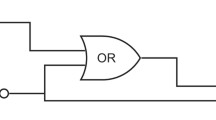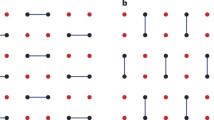Abstract
We discuss the progress (or lack of it) that has been made in discovering algorithms for computation on a quantum computer. Some possible reasons are given for the paucity of quantum algorithms so far discovered, and a short survey is given of the state of the field.
PACS: 03.67.Lx
Similar content being viewed by others
REFERENCES
P. W. Shor, “Polynomial Time Algorithms for Prime factorization and Discrete logarithms on a Quantum Computer,”
L. K. Grover, “Quantum Mechanics Helps in Searching for a Needle in a Haystack", Phys. Rev. Lett. 78, 325–328 (1997).
P. W. Shor, “Why haven't More Quantum Algorithms been Found?" J. ACM 50, 87–90 (2003); Siam J. Comput. 26, 1484-1509 (1997).
S. Cook, “The Complexity of Theorem Proving Procedures,” in Proc. of the 3rd Annual ACM Symposium on Theory of Computing(ACM Press, New York 1971), pp. 151–158.
R. Karp, “Reducibility Among Combinatorial Problems,” in (R. Miller, and J. Thatcher), Complexity of Computer Computations, (Plenum, NY, 1972), pp. 85–103.
L. A. Levin, Problems of Information Transmission"Universal Search Problems,” 9(3), 265–266 (1973) [Russian].
M. R. Garey and D. S. Johnson, Computers and Intractability: A Guide to the Theory of NP-Completeness, (W. H. Freeman and Company, 1979).
S. Cook, “The P versus NP Problem,” at http://www.claymath.org/millennium/.
M. Sipser, “The History and Status of the P Versus NP Question,” in Proc. 24th ACM Symposium on the Theory of Computing, 1992, pp. 603–619.
C. H. Bennett, E. Bernstein, G. Brassard, and U. Vazirani, “Strengths and Weakness of Quantum Computing", SIAM J. Comput. 26, 1510–1523 (1997).
D. Aharonov and O. Regev, “Lattice Problems in NP ? co-NP,” manuscript in preparation, available at www.tau.ac.il/ odedr/.
D. R. Simon, “On the Power of Quantum Computation Siam", J. Comput. 26, 1474–1483 (1997).
M. Mosca and A. Ekert,. ”The Hidden Subgroup Problem and Eigenvalue Estimation on a Quantum Computer,” in Proc. of the 1st NASA International Conference on Quantum Computing and Quantum Communication, Palm Springs, USA, Lecture Notes in Computer Science, 1509(1999); arXiv: quant-ph/9903071.
S. Hallgren, “Polynomial-time Algorithms for Pell's Equation and the Principal Ideal Problem,” in Proc. 34th Annual ACM Symposium on Theory of Computing, (ACM Press, 2002), pp. 653–658.
W. van Dam, S. Hallgren, and L. Ip, “Quantum Algorithms for Some Hidden Shift Problems,” pp. 489–498. Proc. ACM-SIAM Symposium on Discrete Algorithms, 2003
R. Beals, “Quantum computation of Fourier Transforms over Symmetric Groups,” in Proc. 29th Annual ACM Symposium on Theory of Computing, 1997, pp. 48–53.
M. Ettinger and E. H¨oyer, “On Quantum Algorithms for Non-commutative Hidden Subgroups,” arXiv: quant-ph/9807029.
G. Kuperberg, “A Subexponential-time Quantum Algorithm for the Dihedral Hidden Subgroup Problem,” arXiv: quant-ph/0302112.
L. K. Grover and A. M. Sengupta, “From Coupled Pendulums to Quantum Search,” in R. K. Brylinski and G. Chen, Eds, Mathematics of Quantum Computation, (Chapman & Hall/CRC, Boca Raton, FL), pp. 119–134.
G. Brassard, P. H¨oyer, M. Mosca, and A. Tapp, “Quantum Amplitude Amplification and Estimation,” AMS Conterporary Math Series 305, 53–74 Quantum Computation and Information, Amer. Math. Soc. (2002).
L. K. Grover, “Quantum Computers can Search Rapdily by Using Almost any Transformation,” Phys. Rev. Lett. 80, 4329–4332 (1998). "Needle in a Haystack", Phys. Rev. Lett. 78, 325-328 (1997).
A. Ambainis, “Quantum Walk Algorithm for Element Distinctness,” quant-ph/0311001.
A. Ambainis, “Quantum Walks and their Algorithmic Applications,” quant-ph/0403120.
A. Ambainis, J. Kempe, and A. Rivosh, “Coins Make Quantum Walks Faster,” quantph/ 0402107.
A. M. Childs, R. E. Cleve, E. Deotto, E.Farhi, S. Gutmann, and D. A. Spielman, “Exponential Algorithmic Speedup by Quantum Walk,” pp.59–68. Proc. 35th ACM Symposium on Theory of Computing, (ACM Press, 2003).
M. Bordewich, M. Freedman, L. Lov´asz, and D. Welsh, “Approximate Counting and Quantum Computation,” available at http://research.microsoft.com/research/theory/freedman/.
W. van Dam, “Quantum Computing and Zeroes of Zeta Functions,” arXiv: quantph/ 0405081.
E. Farhi, J. Goldstone, S. Gutman, and M. Sipser, “Quantum Computation by Adiabatic Evolution,” arXiv: quant-ph/0001106.
D. Aharonov, W. van Dam, J. Kempe, Z. Landau, S. Lloyd, and O. Regev, “Adiabatic Quantum Computation is Equivalent to Standard Quantum Computation,” arXiv: quant-ph/0405098.
Author information
Authors and Affiliations
Rights and permissions
About this article
Cite this article
Shor, P.W. Progress in Quantum Algorithms. Quantum Information Processing 3, 5–13 (2004). https://doi.org/10.1007/s11128-004-3878-2
Issue Date:
DOI: https://doi.org/10.1007/s11128-004-3878-2




